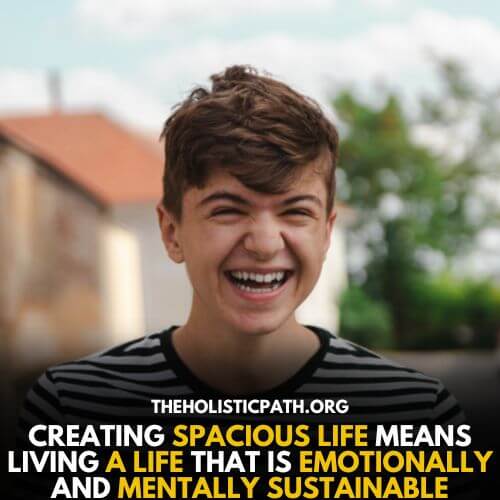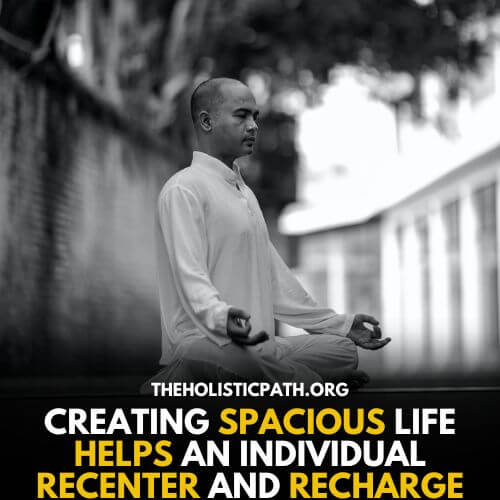Life can feel really full sometimes. There’s always something to do, somewhere to be, someone to see. It can be hard to find the time and space to just be.
But what if creating space in our lives – emotionally and mentally – is actually the key to a happier, more fulfilled existence?
In this article, we’ll explore what it means to create a spacious life, and how doing so can lead to a more contented state of being. So if you’re feeling overwhelmed and ready for a change, read on!
What Is Actually Meant By Creating Spacious Life?
Creating spacious life is creating a life with room to breathe. It’s creating a life where you’re not constantly juggling a million things and instead, you have time and space to just be.
Creating spacious life is about having a margin in your schedule so that you’re not always rushed and running from one thing to the next. It’s about creating a margin in your relationships so that you don’t feel like you’re constantly giving and never receiving.
Creating spacious life means living a life that is emotionally and mentally sustainable. It’s creating a life where you have the time and energy to pursue the things that bring you joy. It’s creating a life where you’re not just surviving, but thriving. So, how do you create a spacious life?

First, start by taking stock of what areas of your life are feeling cramped. Are you overscheduled? Is your inbox overflowing? Do you feel like you’re constantly putting out fires?
Once you identify the areas of your life that need some more space, start making changes. Maybe it means saying no to some commitments or unsubscribing from some email lists. Maybe it means setting boundaries with people in your life who are demanding too much of your time and energy.
Whatever it looks like for you, creating spaciousness in your life will lead to more peace, more joy, and more balance.
What Is Mental Spaciousness
Mental spaciousness is creating a life where we have room to breathe, think and feel. It’s creating space in our lives – both inner and outer space. When we are mentally spacious, we are able to be present at the moment and not be overloaded by the past or the future.
We can make clear decisions, relate to others with more ease, and have a greater sense of well-being. Mental spaciousness allows us to live more fully and deeply. To create mental spaciousness, we need to declutter our lives – both physically and emotionally.
We need to let go of what no longer serves us so that we can make room for what does.
When we do this, we open up possibilities for a richer, fuller life.
Why Emotional Spaciousness Is Important
When we talk about creating emotional spaciousness in our lives, what we’re really talking about is having space for all our emotions – the good, the bad, and the ugly.
Too often, we stuff down our negative emotions or try to push them away, but this only creates more problems in the long run. By creating space for all our emotions, we’re able to process them and move through them in a healthy way.
This doesn’t mean that we have to sit with our pain 24/7 – it just means that we’re open to feeling it when it comes up, and we’re not afraid of it. When we can do this, we open up a whole world of possibilities in our lives.
We become more joyful, more creative, and more present.
We’re able to connect with ourselves and others in a deeper way, and we can start living the life we really want to live.
5 Benefits Of Creating Spacious Life
Creating spacious life has its benefits that emotionally and mentally. It gives you the opportunity to grow emotionally and mentally.
1. Creating Spacious Life Creates Opportunities:
When you feel emotionally and mentally constricted, it creates negative consequences such as feeling trapped, suffocated, and stifled. But when you have emotional and mental space, it opens up opportunities for you to pursue your goals and dreams. You are able to take risks without feeling like you’re going to explode.
2. Creating Space Allows You To Process Your Emotions And Thoughts:
When you have a lot of space, you’re able to calmly reflect on your experiences and process them in a healthy way. This is in contrast to being overwhelmed by your emotions which can lead to unhealthy coping mechanisms such as overeating, drinking, or using drugs.
3. Creating Spacious Life Gives You Time To Relax And Recharge:
When you’re constantly on the go, it’s difficult to find time to just be still and relax. But when you create spacious life, it allows you to have that time for yourself to recenter and recharge.

4. Creating Space Helps You Connect With Others:
When you’re constantly surrounded by people, it can be difficult to have meaningful connections with others. But when you have emotional and mental space, it allows you to be more open and vulnerable with others which leads to deeper relationships.
5. Creating Space Improves Your Overall Well-Being:
When you have emotional and mental space, it leads to increased self-awareness, decreased stress levels, improved sleep patterns, and increased creativity. So if you’re feeling overwhelmed and constricted in your life, creating spacious life can help improve your overall well-being.
Spacious living can also help to boost our creativity. When we feel bogged down by clutter, it can be hard to come up with new ideas. By decluttering our minds and homes, we can open up new possibilities for creativity and innovation.
Spacious living can help us to find a greater sense of purpose in life. When we’re constantly bombarded by distractions, it can be hard to stay focused on what’s truly important to us. By creating more space in our lives, we can make it easier to find and pursue our passions and goals.
How To Create Spacious Life For Yourself-9 Effective Ways
Creating spacious life for yourself can be emotionally and mentally liberating. It can allow you to live more in the present, be more spontaneous and experience greater joy.

Here are some ways to create a spacious life for yourself:
- Declutter your physical space. A cluttered space can often lead to a cluttered mind. Take some time to clear out the clutter in your home, office, or car. You’ll be surprised at how much lighter you’ll feel afterward.
- Establish boundaries. Boundaries are essential for creating emotional and mental space in your life. Learn to say no to things that don’t serve you and make time for the things that you love and enjoy. This will help to prevent burnout and allow you more time to focus on what’s important to you.
- Simplify your schedule. We often try to cram too much into our schedules, which can lead to feelings of overwhelm and stress. Instead, try simplifying your schedule so that you have more free time to relax and enjoy your life. This may mean saying no to some commitments or cutting back on your work hours.
- Connect with nature. Nature has a way of grounding us and helping us to feel more connected to the present moment. Spend time outside every day, even if it’s just a few minutes. This can help to center you and give you a sense of peace.
- Disconnect from social media and the news. Constantly scrolling through negative news stories and comparing your life to others’ highlight reels can leave you feeling stressed and down. Instead, take some time each day to disconnect from the outside world and focus on what’s going on inside of you.
- Be mindful of your thoughts. Our thoughts can have a powerful impact on our mood and outlook on life. If you find yourself getting caught up in anxious or negative thinking, try mindfulness techniques such as meditation or simply focusing on your breath to bring yourself back to the present moment.
- Get rid of anything that’s no longer serving you, including material possessions, toxic relationships, and negative self-talk.
- Learn to say no. You don’t have to please everyone all the time. It’s okay to put your own needs first sometimes.
- Be present in the moment. Instead of letting your mind wander, focus on your senses and what’s happening around you right now.
By following these tips, you can start creating more space in your life – both physically and mentally. You’ll soon find that you have more energy, clarity, and joy in your life as a result!

20 Tips For Spending The Time In Meaningful Way
- Get enough sleep: Most people need around eight hours of sleep per night. Consider going to bed and waking up at the same time each day to help regulate your body’s natural sleep rhythm.
- Eat healthy: Eating nutritious foods helps your body to function at its best. Make sure to include plenty of fruits, vegetables, and whole grains in your diet.
- Exercise: Exercise is a great way to boost your energy levels and mood. Even just a moderate amount of exercise can make a big difference.
- Take breaks: When you’re feeling overwhelmed or stressed, take a few minutes to yourself to relax and rejuvenate. Take a hot bath, read your favorite book, or take a walk outdoors.
- Spend time with loved ones: Spending time with loved ones can help reduce stress and promote positive emotions. Whether you stay in touch via text, social media, or in person, quality time with those you care about is crucial for a healthy mind and body.
- Pursue hobbies: Doing things you enjoy can help reduce stress and improve your overall well-being. Whether you enjoy painting, playing an instrument, or hiking, find time to do the things you love on a regular basis.
- Volunteer: Giving back to your community can help you feel good about yourself and make a positive impact on those around you. There are many different ways to volunteer, so find an opportunity that interests you and get involved!
- Connect with nature: Research has shown that spending time in nature can improve mental health and well-being. If possible, try to spend time outside every day, even if it’s just for a few minutes.
- Live in the moment: One of the best ways to reduce stress is to focus on the present moment and let go of worries about the past or future. Try mindfulness meditation or other relaxation techniques to help you stay present and avoid rumination.
- Practice gratitude: Expressing gratitude has been linked with improved mental health and well-being. Make it a habit to express things you’re thankful for on a daily basis, whether it’s in a journal entry or in conversation with loved ones.
- Read more often: Make reading a habit by setting aside some time each day (or week) to curl up with a good book– fiction or non-fiction, it doesn’t matter.
- Write things down: Keep a journal to document your thoughts and feelings, or start writing stories or poems – it’s therapeutic and can be really fun too!
- Cook healthy meals: Cooking at home allows you to control the ingredients that go into your food, which can help you to eat healthier overall. It can also be therapeutic to prepare delicious meals for yourself or others.
- Watch comedies: Laughing has many benefits for mental health, including reducing stress levels, boosting moods, improving cardiovascular health, and even pain relief.
- Gardening: It gives you fresh air, sunshine, and exercise while allowing you to produce healthy food for yourself or others.
- Dance: Dancing is a great way to get moving while having fun. It’s also been shown to improve moods, cognitive function, and social interactions.
- Listen to music: Listening to music that you enjoy can boost your mood, lower stress levels, and promote relaxation.
- Do nothing: Just take some time each day to relax without doing anything specific. Allow yourself some space to just be. Notice the details around you. Breathe deeply… let go of all expectations.. simply enjoy being alive in this moment.
- Spend time with animals: Animals have been shown to provide numerous benefits for our mental and emotional health including reducing stress levels and easing anxiety and depression symptoms.
- Connect with your spirituality: Whether you consider yourself religious or not, connecting with something bigger than yourself can help give life some deeper meaning and purpose.
Conclusion
There’s no doubt that creating a more spacious life can have a positive impact on our mental and emotional well-being. When you create spaciousness in your life, you open yourself up to new possibilities and experiences.
Creating a spacious life doesn’t have to be complicated. By implementing just a few simple changes, you can create a more open and inviting life.
So go ahead and declutter your schedule, say no to some commitments, and make time for what matters most to you. Your life will be all the richer for it.
